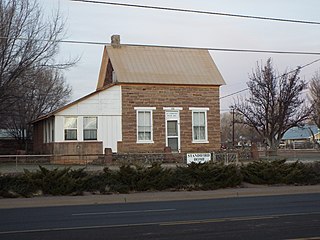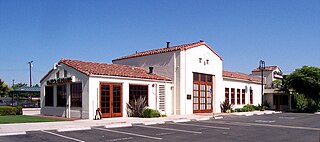
Holbrook is a city in Navajo County, Arizona, United States. According to the 2010 census, the population of the city was 5,053. The city is the county seat of Navajo County.

Taylor is a town in Navajo County, Arizona, United States. It was founded by Mormon settlers in January 1878, several months before the neighboring community of Snowflake. Taylor straddles Silver Creek, flowing from the nearby White Mountains to the Little Colorado River on Arizona's Colorado Plateau. According to the 2010 census, the population of the town is 4,112. The town was named for John Taylor, the third president of the Church of Jesus Christ of Latter-day Saints.

The Atchison, Topeka and Santa Fe Railway, often referred to as the Santa Fe or AT&SF, was one of the larger railroads in the United States. The railroad was chartered in February 1859 to serve the cities of Atchison and Topeka, Kansas, and Santa Fe, New Mexico. The railroad reached the Kansas–Colorado border in 1873 and Pueblo, Colorado, in 1876. To create a demand for its services, the railroad set up real estate offices and sold farmland from the land grants that it was awarded by Congress.

The San Bernardino Line is a Metrolink line running between Downtown Los Angeles east through the San Gabriel Valley and the Inland Empire to San Bernardino, with limited express service to Redlands. It is one of the three initial lines on the original Metrolink system, along with the Santa Clarita Line and the Ventura County Line.

Dearborn Station was, beginning in the late 1800s, one of six intercity train stations serving downtown Chicago, Illinois. It remained in operation until May 1, 1971. Built in 1883, it is located at Dearborn and Polk Streets, adjacent to Printers Row. The station was owned by the Chicago & Western Indiana Railroad, which itself was owned by the companies operating over its line. The station is now a shopping mall housing office, retail, and entertainment spaces.

The New Mexico campaign was a military operation of the trans-Mississippi theater of the American Civil War from February to April 1862 in which Confederate Brigadier General Henry Hopkins Sibley invaded the northern New Mexico Territory in an attempt to gain control of the Southwest, including the gold fields of Colorado and the ports of California. Historians regard this campaign as the most ambitious Confederate attempt to establish control of the American West and to open an additional theater in the war. It was an important campaign in the war's Trans-Mississippi Theater, and one of the major events in the history of the New Mexico Territory in the American Civil War.

Winona is a small populated place in Coconino County in the northern part of the U.S. state of Arizona. At one time it was also called Walnut, and Winona's railroad station was renamed Darling in honor of an engineer.

The Fred Harvey Company was the owner of the Harvey House chain of restaurants, hotels and other hospitality industry businesses alongside railroads in the Western United States. It was founded in 1876 by Fred Harvey to cater to the growing number of train passengers.

Phoenix Union Station is a former train station at 401 South 4th Avenue in downtown Phoenix, Arizona, United States. From 1971 to 1996 it was an Amtrak station. Until 1971, it was a railroad stop for the Santa Fe and Southern Pacific Railroads. Union Station was served by Amtrak's Los Angeles–New Orleans Sunset Limited and Los Angeles–Chicago Texas Eagle. The station is on the National Register of Historic Places.

Santa Fe Depot in San Diego, California, is a union station built by the Atchison, Topeka and Santa Fe Railway to replace the small Victorian-style structure erected in 1887 for the California Southern Railroad Company. The Spanish Colonial Revival style station is listed on the National Register of Historic Places and is a San Diego Historic Landmark. Its architecture, particularly the signature twin domes, is often echoed in the design of modern buildings in Downtown San Diego.

Winslow station is an Amtrak train station at 501 East Second Street in Winslow, Navajo County, Arizona, United States. It is served daily by Amtrak's Southwest Chief between Chicago, Illinois and Los Angeles, California. The Santa Fe Depot and La Posada Hotel Harvey House compound are the centerpiece of the La Posada Historic District.

Williams Depot is a privately owned train station in Williams, Arizona. It is the southern terminus of the Grand Canyon Railway line.

The Fullerton Transportation Center is a passenger rail and bus station located in Fullerton, California, United States.

Orange station, formally the Orange Transportation Center, is an intermodal transit station in Orange, California. It serves Metrolink trains as well as Orange County Transportation Authority buses. The station is located at the site of two former Atchison, Topeka and Santa Fe Railway combination depots. The present depot structure was dedicated on May 1, 1938, and was closed with the Santa Fe's discontinuation of passenger service in 1971. The building was granted historic landmark status by the City on November 15, 1990.

The San Bernardino Santa Fe Depot is a Mission Revival Style passenger rail terminal in San Bernardino, California, United States. It has been the primary station for the city, serving Amtrak today, and the Santa Fe and Union Pacific Railroads in the past. Until the mid-20th century, the Southern Pacific Railroad had a station 3/4 of a mile away. It currently serves one Amtrak and two Metrolink lines. The depot is a historical landmark listed on the National Register of Historic Places as Atchison, Topeka and Santa Fe Railway Passenger and Freight Depot.

The Chili Line, officially known as the Santa Fe Branch, was a 3 ft narrow-gauge branch of the Denver and Rio Grande Western Railroad (D&RGW). It ran 125.6 miles (202.1 km) from Antonito, Colorado, to Santa Fe, New Mexico. The Denver and Rio Grande Railway (D&RG) began construction of the line in 1880 and completed the line from Antonito to Española, New Mexico, but could not build any further because of an agreement with the Atchison, Topeka and Santa Fe Railroad (AT&SF). The Texas, Santa Fe and Northern Railroad was incorporated to complete the line, and the line between Española and Santa Fe opened in 1886 and was transferred to the Denver and Rio Grande shortly thereafter. The D&RGW closed the Chili Line in 1941 because of competition from road transportation, and the line was abandoned shortly thereafter.

Gulf, Colorado and Santa Fe Railroad Passenger Station is a former passenger train station in Fort Worth, Texas. From 1971 to 2002, it was used as Fort Worth's Amtrak station.
Dennison was a stop on the Atchison, Topeka and Santa Fe Railway between Canyon Diablo, and Winslow, Arizona, United States, in Coconino County. Formerly in Yavapai County, it came to be in Coconino County upon the latter's creation in 1891. Dennison was named for a railroad roadmaster named Denny.
















